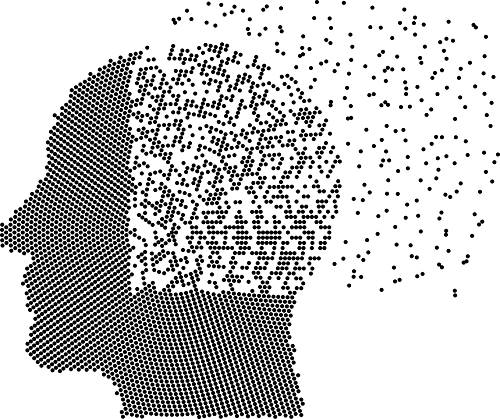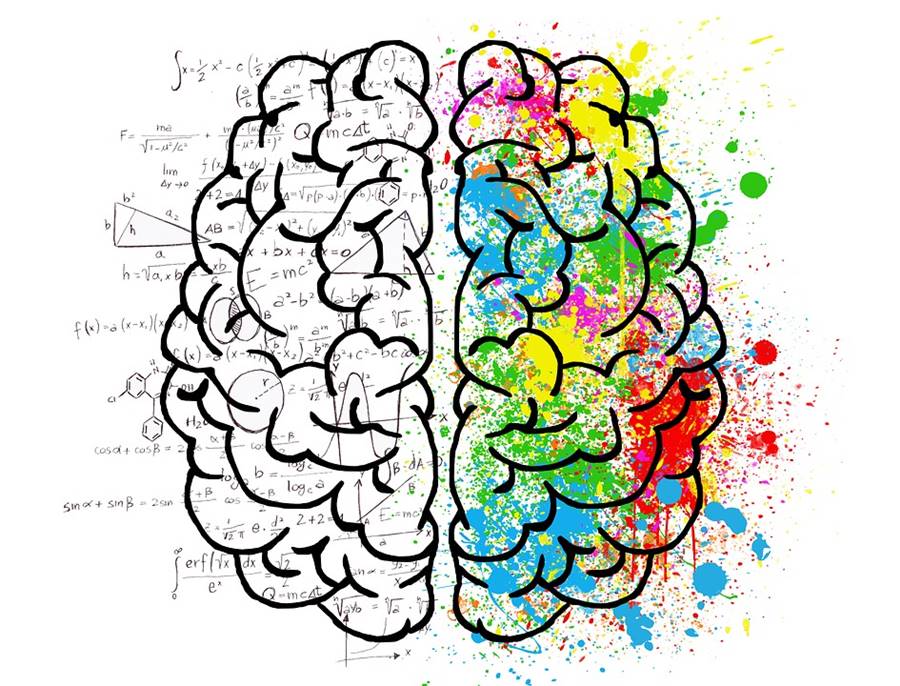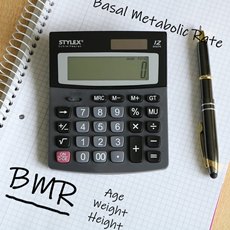Maintain your Mental Fitness as you age
Aging: How to Prevent Brain Decay
First published: 30.Oct.2018
Aging entails the risk of memory decline, dementia, and cognitive impairment for older adults.
Roughly 8.8% of those aged 65 or older in the US suffer from dementia. That means 4 to 5 million older adults.
What can be done to ward off Alzheimer's disease, preserve brain health, mental fitness, and cognitive abilities?
Is there evidence that physical exercise, meditation, stress management, or engaging in intellectual activities to stimulate the brain may help prevent dementia? Is it really a case of "use it or lose it"?
Today's article addresses those and other issues, and the scientific evidence behind them so that you can make the lifestyle changes necessary to live with a sound mind into your old age.

What is Dementia?
Dementia isn't a specific disease, it is a name that describes a decline of mental ability in older people that is so severe that it interferes with everyday activities.
Dementia is characterized by symptoms such as memory decline, loss of focus and concentration, and the impairment of intellectual abilities such as reasoning, communication, and language.
Although Alzheimer's disease (AD) is one of the leading causes of dementia (around 70% of the cases), there are other causes such as strokes, which cause vascular dementia.
At one time it was known as "senility" or "senile dementia" and was taken as a normal stage in late life. But the viewpoint has shifted.
Many older people have memory loss issues, but that does not mean that they have dementia or Alzheimer's.
What Causes Dementia?
When the brain cells are damaged they cannot communicate efficiently with each other and this disrupts the normal functioning of the brain: thinking, feeling, and communicating can be affected.
Different parts of the brain perform different functions, and damage to these areas hinders their function, such as movement, or abstract thought.
Alzheimer's disease, also known as AD (named after Alois Alzheimer who described it in 1906), is caused by certain proteins that accumulate inside the brain's tissue, both inside the brain cells or neurons, and outside of them. The proteins agglomerate, forming amyloid plaques that kill brain cells.
Alzheimer's appears in a part of the brain known as the "hippocampus" which has an important role in the processing of memories and learning. That is why the onset of the disease causes severe memory loss.
Some other factors such as vitamin deficiencies, alcoholism, thyroid problems, and side effects of certain medications may cause dementia-like symptoms and memory issues but they may improve if these factors are treated.
Below we will look into the lifestyle behaviors that may help reduce the risk of dementia (and those that may increase it).
Lifestyle choices, behaviors, and their link with Dementia
Cardiovascular disease and diabetes can cause health problems that lead to dementia. Alzheimer's also has a genetic component that may or may not manifest itself. There are triggering factors that can alter a cell's DNA and modify how its genes express themselves. These triggers are called "epigenetic" factors.
Epigenetic factors can be environmental, chemical, even stress caused by a famine can produce harmful changes in the expression of genes. However, some epigenetic factors may provoke benign changes, which can protect the individual from his or her genetic inheritance.
Alzheimer's may be triggered by lifestyle choices, and below we will see how these interplay with the disease.
Better Education and Health Care reduces Risk for Dementia
According to a study by Langa (2017) (1) the prevalence of dementia among Americans aged 65 or older, decreased from 11.6% to 8.8% between 2000 and 2012.
Langa found a positive correlation between being better educated and lower risk for dementia, and he attributed it to the healthier behaviors associated with more years of education (i.e. a college graduate vs. a highs chool grad); this means less smoking, better eating habits, and more physical activity, and also occupations that require more use of cognitive functions and, equally important better access to health care.
The risk of dementia due to heart disease and diabetes also decreased due to improved cardiovascular and diabetes treatments.
Langa concludes that "Our study, along with prior studies, supports the notion that "cognitive reserve" resulting from early-life and life-long education and cognitive stimulation may be a potent strategy for the primary prevention of dementia."
Alzheimer's disease and Education
Margaret Gatz (2005) (2) reported that "the risk of Alzheimer's disease is two to four times higher in those who have fewer years of education, as compared to those who have more years of education."
Physical Fitness Protects against Dementia
A team led by Nieboer (2014) (3) looked into the effects of a healthy physically active lifestyle on the brain. To do so, they studied a group of 219 healthy adults aged 41 to 44 and found that their intelligence quotient or IQ was related to their cardiorespiratory fitness.
Fitness also increased global neuronal network integration linking different parts of the brain.
More recently, Fernandes RM et al. (2018) (4) reported "an association between moderate physical exercise and cognition" that reduced simple reaction time, improved response precision, and working memory.
In their overview of different studies, Gregory J. Christie, et al., (2017) (5) found that being fit besides improving quality of life in older adults (because they maintain their independence to do things by themselves), also reduced the chance of falls and bone fractures (older adults with dementia fall 3 times more often than cognitively healthy seniors.
Christie's review also looked into the effects of exercise on the brain:
- A study of 5,925 older women followed-up during a 6 to 8 year period found "that women with greater levels of physical activity were less likely to experience cognitive decline."
- Most studies focused on aerobic exercise, but resistance or strength training also had a positive effect.
- But, they couldn't determine which element of exercising is critical for brain health (intensity, frequency, or duration of exercise).
- Exercising during youth protected against dementia: a study of 1,241 men and women aged 62 to 85 years found that regular physical activity in early life (ages 15 to 25), but only in men resulted in a faster processing speed in older age.
Take-home point
Physical exercise, even if moderate, improves cognition
Myuri Ruthirakuhan et al. (2012) (6) reported that Alzheimer's disease patients "showed significant cognitive improvements" when they performed "cycling training and somatic and isotonic-relaxation exercises."
Musical experience and Dancing
Musical activities even if brief (one hour per week during six months) improve the physical and cognitive fitness in older adults (Dinse et al., 2013) (7) if these activities involve dancing, it stimulates brain processes that control attention, muscular coordination, memory (learning and rehearsing dance sequences), stimulus perceptions, emotions, and also impacts on cardiovascular fitness (5).
Dancing produces even greater cognitive improvements than Tai Chi and "may be more effective at preserving brain white matter than aerobic and nutritional supplementation." (5)
Weigmann (8) agreed: "Dancing -which is in itself physically and mentally challenging- may be a good measure to keep the brain fit and help prevent Alzheimer's disease."
Take-home point
Dance! and enjoy music; it will help your brain.
How does Exercise protect you against dementia?
Helena Hörder et al. (2018) (9) looked into a group of 1,462 Swedish women of 38 to 60 years of age who were examined for 44 years and found that:
- "High cardiovascular fitness in midlife was associated with a decreased risk of subsequent dementia."
- "High fitness delayed age at dementia onset by 9.5 years and time to dementia onset by 5 years compared to medium fitness."
Hörder postulated two types of effects to explain how physical activity reduces the risk of dementia:
1. Indirect effects of physical activity
Being fit results in lower blood pressure, low cholesterol levels, and lower body weight that in turn reduces the risk of diabetes and its dire consequences.
3. Direct effects of physical activity
Such as enhancement of the brain's neuronal structures, its production of neurotransmitters, and growth factor chemicals. This helps to maintain the brain's structure and abilities.
They mention a study that found "Smaller brain volume" was linked to lower cardiovascular fitness.
Furthermore, physical activity seems to have the greatest influence on the hippocampus region of the brain that is the region most vulnerable to Alzheimer's disease.
The Hippocampus and its relation to dementia
Aranzi discovered it in the late 1500s and as he thought it looked like a "sea horse" he gave it the animal's Latin name.
The hippocampus is involved in our higher cognitive functions and especially in memory processes and also some behaviors related to emotions.
Neurons are born within the hippocampus in a process known as neurogenesis, and this birth of new brain cells takes place across our whole life span, but it decreases with age.
Katrin Weigmann (2014) (8) pointed out that animal studies indicate that physical exercise "increases the proliferation of hippocampal neurons." In other words, exercise helps create new neurons in the hippocampus.
But the birth of new neurons is not enough, and it is learning that keeps them alive.
Gerd Kempermann, Hongjun Song, and Fred H. Gage (2015) (10) suggested that these new neurons are the clue to the "plasticity" of the adult brain. This flexibility results from the combination of physical and mental activity. This combination promotes the birth of new hippocampal neurons and keeps them alive.
Weigmann stated that "A combination of exercising and mental activity has been shown to be most effective in preventing cognitive decline."
Mental Training won't prevent Dementia
Well, at least not ALL types of dementia, but maybe some.
A team led by Unverzagt (2012) (11) examined whether cognitive training helped to reduced the rate of dementia. Their subjects were part of the Advanced Cognitive Training for Independent and Vital Elderly (ACTIVE) study, involving 2,802 individuals (men, women; white, and African American) with a median age of 74 years, and 13 years of education on average.
Their study revealed that "cognitive training was not associated with a lower rate of incident dementia [and ] did not affect rates of incident dementia after 5 years of follow-up."
The type of cognitive training used during the ACTIVE study was focused on memory, reasoning, and speed of processing information.
Gatz (2) also found "little evidence that mental practice will help prevent the development of dementia" yet mentioned that some epidemiological studies have shown that engaging in mentally stimulating activities have a lower prevalence of Alzheimer's.
Some Cognitive Activities may prevent VCI dementia
Don't despair, Verghese and his colleagues (2009) (12) investigated if engaging in different leisure activities (such as reading, playing board games, or musical instruments) reduced the risk of dementia.
They found that an age-related cognitive impairment known as "vascular cognitive impairment" (VCI for short) that can range from "mild impairment" to "dementia" and is caused by vascular risk factors, can be offset by different types of leisure activities.
Their study followed subjects that were initially free of VCI and dementia for twenty-one years.
- Those who took part in the cognitive leisure activities -but not the physical leisure activities had a lower risk of VCI (with or without dementia).
Take-home point
Reading, playing board games, or musical instruments can help reduce the risk of VCI dementia
In the case of Alzheimer's Disease (AD), Myuri Ruthirakuhan et al. (2012) (6) mentioned the effects of different types of intellectual activities on patients suffering from it:
Cognitive stimulation therapy (CS)
CS are informal passive or active activities designed to stimulate the brain, such as playing a game or listening to music. CS can include Reality Orientation (RO), which orients the AD patient regarding places, persons, and time.
CS and RO therapy resulted in improved cognitive functions in AD patients and brought some "positive changes to social and communicative functioning and quality of life."
Cognitive training and rehabilitation
According to Ruthirakuhan, " There is a lack of a consensus ... Although some studies show promising results... others reveal improvement only in specific areas of cognitive training, such as learning personal information and aspects of attention."
Social interaction with peers
Patients that suffer from Alzheimer's Disease realize that their condition isolates them harming their self-confidence and causes anxiety, depression, and withdrawal. So improving social interactions may have a positive effect by reducing the risk of AD and enhancing the patients' quality of life.
Michelle E. Kelly et al. (2017) (13) reviewed 39 studies and found that there is a positive association between increased socialization and cognitive function. However, they point out that the "exact nature of this association remains unclear."
They found that:
Social activity is linked to working memory, visual and spatial abilities, processing speed, and global cognition but are unrelated to verbal fluency, attention, reasoning, or episodic memory.
The social network is linked to global cognition but not to episodic memory.
Social support is associated with global cognition and episodic memory but not with processing speed or attention.
Take-home point
Keep socially active to maintain your mental fitness.

Healthy lifestyle to prevent mental decline
Obesity in midlife is linked to dementia
According to a meta-analysis (Albanese, 2017) (14) being obese in midlife increased the risk of dementia in old age.
They reviewed 19 studies and 589,649 participants which were followed up for up to 42 years and found that "being obese during Midlife (age 35 to 65 years) with a body mass index over 30 was associated with dementia late in life. There was no link for those who were only overweight (with a BMI between 25 and 30)." (BMI is the Body Mass Index).
Take-home point
Keep your BMI below 30 (try not to be obese)
You can calculate your BMI with our BMI (Body Mass Index) Calculator.
Mediterranean Diet improves mental abilities in older adults
A team led by Loughrey (2017) (15) conducted a meta-analysis (a statistical study of other research papers) that involved more than 41,500 subjects in both cohort studies and randomized controlled trials, to find out if there was a relationship between cognitive function and the Mediterranean diet.
The Mediterranean Diet
This diet originated around the Mediterranean sea and was recognized by UNESCO as an Intangible Cultural Heritage of Humanity in 2010.
It is based on vegetables, whole grains, legumes, fruits, olive oil, and it focuses on fish and poultry as a source for animal protein (instead of using red meat). It also includes moderate quantities of red wine. It is a diet rich in fiber, nutrients, healthy fats, vitamins, and antioxidants.
The cohort studies found a significant association between the Mediterranean Diet and:
- Episodic memory.
- Global cognition.
The Randomized trials found that the diet improved:
- Delayed recall.
- Working memory.
- Global Cognition.
However, it didn't have any effect on semantic memory, immediate recall, paired associates, attention, processing speed, or verbal fluency.
Take-home point
Eating a Mediterranean diet will have a beneficial effect on your global cognition levels.
Meditation and Dementia
Gregory J. Christie's team (5) found insufficient data to determine the effectiveness of improved cardiovascular risk and admitted that the evidence linking meditation to improved cognition in old age is still in its early stages.
Closing comments
Your old-age brain health depends on many different factors. Genetic influences are very important (roughly 50% of the total effect) and may help explain who develops Alzheimer's disease (AD) and who does not.
However, lifestyle decisions make up the other 50%, and these choices even if taken early in life have a profound impact brain health: exercising during youth (in your teens and early twenties) can influence your old-age cognitive abilities. Obesity during midlife, your level of education (going to college or not) are also choices taken before you age which impact on your brain development.
As you age, you should try to eat a balanced nutritious diet, manage stress, keep strong social bonds, and keep physically active (do exercise, walk, dance, cycle) and maintain your vascular health. Cognitive activities, learning, playing games, or musical instruments may help a little too but there is no firm evidence that they can prevent AD.
References and Further Reading
(1) Kenneth M. Langa, (2017). A Comparison of the Prevalence of Dementia in the United States in 2000 and 2012. JAMA Intern Med. 2017 Jan 1; 177(1): 51-58. doi: [10.1001/jamainternmed.2016.6807]
(2) Margaret Gatz, (2005). Educating the Brain to Avoid Dementia: Can Mental Exercise Prevent Alzheimer Disease?. PLoS Med. 2005 Jan; 2(1): e7. 2005 Jan 25. doi: [10.1371/journal.pmed.0020007]
(3) Douw L, Nieboer D, van Dijk BW, Stam CJ, Twisk JW, (2014). A healthy brain in a healthy body: brain network correlates of physical and mental fitness. PLoS One. 2014 Feb 3;9(2):e88202. doi: 10.1371/journal.pone.0088202. eCollection 2014
(4) Fernandes RM et., al (2018). The Effects of Moderate Physical Exercise on Adult Cognition: A Systematic Review. Front Physiol. 2018 Jun 8;9:667. doi: 10.3389/fphys.2018.00667. eCollection 2018
(5) Gregory J. Christie, et al., (2017). Do Lifestyle Activities Protect Against Cognitive Decline in Aging? A Review. Front Aging Neurosci. 2017; 9: 381. 2017 Nov 20. doi: [10.3389/fnagi.2017.00381]
(6) Myuri Ruthirakuhan et al., (2012). Use of Physical and Intellectual Activities and Socialization in the Management of Cognitive Decline of Aging and in Dementia: A Review. J Aging Res. 2012; 2012: 384875. 2012 Dec 31. doi: [10.1155/2012/384875]
(7) Kattenstroth J-C, Kalisch T, Holt S, Tegenthoff M, Dinse HR (2013). Six months of dance intervention enhances postural, sensorimotor, and cognitive performance in elderly without affecting cardio-respiratory functions. Front Aging Neurosci 5: 5
(8) Katrin Weigmann (2014). Why exercise is good for your brain - A closer look at the underlying mechanisms suggests that some sports, especially combined with mental activity, may be more effective than others. EMBO reports (2014) 15, 745-748 DOI 10.15252/embr.201439051
(9) Helena Hörder et al., (2018). Midlife cardiovascular fitness and dementia A 44-year longitudinal population study in women. Neurology. 2018 Apr 10; 90(15): e1298-e1305. doi: [10.1212/WNL.0000000000005290]
(10) Gerd Kempermann, Hongjun Song and Fred H. Gage, (2015). Neurogenesis in the Adult Hippocampus. Cold Spring Harb Perspect Biol September 2015;7:a018812, doi: 10.1101/cshperspect.a018812
(11) Frederick W. Unverzagt, et al., (2012). ACTIVE Cognitive Training and Rates of Incident Dementia. J Int Neuropsychol Soc. 2012 Jul; 18(4): 669-677. 2012 Mar 9. doi: [10.1017/S1355617711001470]
(12) Verghese J, Cuiling W, Katz MJ, Sanders A, Lipton RB (2009). Leisure activities and risk of vascular cognitive impairment in older adults. J Geriatr Psychiatry Neurol 22: 110-118
(13) Michelle E. Kelly et al., (2017). The impact of social activities, social networks, social support and social relationships on the cognitive functioning of healthy older adults: a systematic review. Syst Rev. 2017; 6: 259. 2017 Dec 19. doi: [10.1186/s13643-017-0632-2]
(14) Albanese E. et al., (2017). Body mass index in midlife and dementia: Systematic review and meta-regression analysis of 589,649 men and women followed in longitudinal studies. Alzheimer's Dement (Amst). 2017 Jun 20;8:165-178. doi: 10.1016/j.dadm.2017.05.007. eCollection 2017
(15) Loughrey DG, et al., (2017). The Impact of the Mediterranean Diet on the Cognitive Functioning of Healthy Older Adults: A Systematic Review and Meta-Analysis. Adv Nutr. 2017 Jul 14;8(4):571-586. doi: 10.3945/an.117.015495. Print 2017 Jul
About this Article
Maintaining your Mental Fitness in old age, A. Whittall
©2018 Fit-and-Well.com, 30.Oct.2018. Updated. 05.Dec.2020. https://www.fit-and-well.com/wellness/mental-fitness.html
Tags: cognitive functioning, dementia, Alzheimer's Disease, mental health, mental fitness, mental decline, aging.
This Webpage
Subject: Fit-and-Well.com. Maintain your mental fitness as you age: what can you do to keep your mental health, ward off dementia, and try to prevent Alzheimer's disease as you age? Exercise, keep physically, socially, and mentally active, lose weight, and eat well can help prevent or retard mental decline due to aging.






